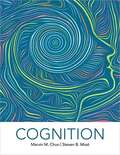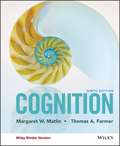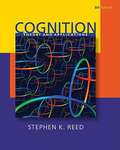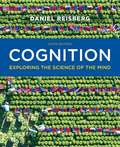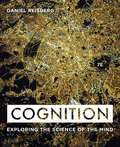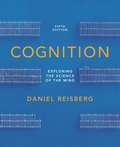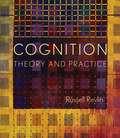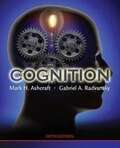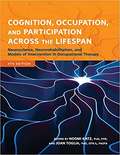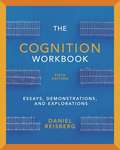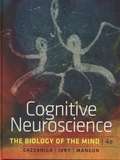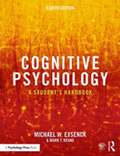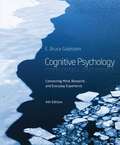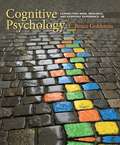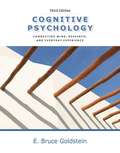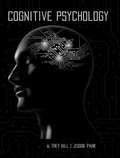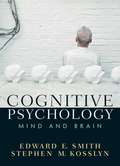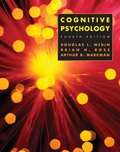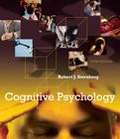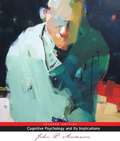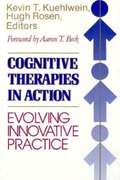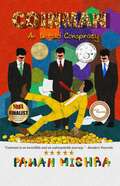- Table View
- List View
Cognition (Sinauer Series)
by Marvin Chun Steven MostChun and Most's Cognition brings new, modern vitality to course materials by presenting exciting findings from cognitive psychology in a way that students can easily grasp. Highlighting everyday-life applications, Cognition motivates students to share in the excitement of cognitive psychology through highly relevant examples, discussions, and demonstrations. Its engaging prose and pedagogical features, such as "Think for Yourself" and "See for Yourself," immerse students in the process of scientific discovery. <p><p> This comprehensive text presents both classic and contemporary research, emphasizing conceptual understanding and lifelong discovery. In addition, the authors integrate exciting new topic areas such as emotion and highlight essential connections to social, clinical, and developmental psychology. A robust multimedia package extends discovery through high-quality demonstrations (Discovery Labs), videos, and quizzing tools to help students succeed. Cognition and its accompanying resources, including the test bank, can be integrated directly into instructors' learning management systems to save time and simplify access.
Cognition
by Margaret W. Matlin Thomas A. FarmerMargaret Matlin and new co-author Thomas Farmer's Cognition demonstrates how cognitive processes are relevant to everyday, real-world experiences, and frequently examines how cognition can be applied to other disciplines such as clinical psychology, social psychology, consumer psychology, education, communication, business, medicine, and law. The 9th edition continues to relate cognitive topics to applications in everyday life. This edition is fully updated with research and additional anecdotes. It also includes more research on neuroscience.
Cognition: Theory and Applications (8th edition)
by Stephen K. ReedAimed at college undergraduates, this text offers a clear and comprehensive overview of the rapidly evolving field of cognition. Reed (psychology, San Diego State U. ) shows the direct relevance of cognitive psychology to daily activities and the impact of cognitive theories on other fields of psychology. This seventh edition includes new material on current topics such as experience-based versus theory- based judgments of retention, Barsalou's perceptual symbols theory, Kintsch's construction-integration model of text comprehension, and decision frames for risk dimensions. The text has a companion online lab and study guide.
Cognition: Exploring the Science of the Mind, 6th Edition
by Daniel ReisbergCognition uses the best of current research to help students think like psychologists and understand how cognitive psychology is relevant to their lives. The Sixth Edition offers revised and revitalized ZAPS 2.0 Cognition Labs, enhanced neuroscience illustrations, and a new ebook, providing a highly interactive way for students to learn cognitive psychology.
Cognition: Exploring The Science Of The Mind
by Daniel ReisbergOne of the most successful texts ever published on its subject, the new Seventh Edition focuses on the insights and ideas that drive the field and supports student learning. Three exciting features—a new pedagogical program based on the “testing effect,” a comprehensive, author-created instructor’s guide, and ZAPS Cognition Labs—deliver a dynamic, interactive introduction to cognitive psychology today.
Cognition: Exploring the Science of the Mind (Fifth Edition)
by Daniel ReisbergCognition uses the best of current research to help students think like psychologists and understand how cognitive psychology is relevant to their lives. The Fifth Edition offers a streamlined presentation, introduces an attractive new full-color design and an expanded art program, and has been thoughtfully updated with the best of current research.
Cognition: Theory and Practice
by Russell RevlinThe author wrote this book with his students in mind so as to address their questions and to challenge them to grasp the methodologies, findings, and applications of basic research.
Cognition (5th edition)
by Mark H. Ashcraft Gabriel A. RadvanskyFor undergraduate level psychology courses in Cognition and Theories of Learning. The psychology of human memory and cognition is fascinating, dealing with questions and ideas that are inherently interesting, such as how we think, reason, remember, and use language. Using a first person narrative, posing direct questions to the reader, and balancing classic research with cutting edge topics, the author draws in the reader and conveys the excitement of the field. Reflecting the increasing use of new technologies to study memory and cognition, Ashcraft and the new co-author, Gabriel Radvansky, continue to integrate sections on neurosciences within individual chapter topics.
Cognition And Occupation Across The Lifespan: Neuroscience, Neurorehabilitation And Models Of Intervention In Occupational Therapy
by Noomi KatzOccupational therapy clinicians have the knowledge and skills to address the consequences of cognitive, neurological, and executive dysfunctions that can result from aging, illness, brain injury, stroke, or neurodevelopmental disorder. Practitioners can guide people facing neurological dysfunction to gain the skills they need to participate in family, work, and community life. The fourth edition of Cognition, Occupation, and Participation Across the Lifespan not only updates the information from previous edition, but also has expanded content, including 9 new chapters, a new section on children and adolescents, and content on topics includiong ethical considerations, consumer technologies, and development of cognition and executive functions. Providing intervention models grounded in neuroscience and occupation, this comprehensive new edition of the best-seller examines current evidence and best practices for working with clients across the lifespan. Cognitive models include theoretical basis, evaluation and intervention processes, and evidence to help clinicians teach clients processing strategies that use their assets to achieve successful occupational performance and participation. Chapters include key terms and concepts, learning objectives, case examples, and a summary of key points.
The Cognition Workbooks: Essays, Demonstrations, and Explorations
by Daniel ReisbergThe Cognition Workbook contains engaging essays on research methodology and applications to topics like the legal system and education. Students are offered numerous hands-on activities to try themselves, including demonstrations of articulatory rehearsal loops, common errors in judgment and reasoning, the effect of practice on the cognitive unconscious, and many more. The new edition includes many new essays, activities, and demonstrations that focus on the real-world applications of cognitive psychology, and builds a bridge between the course and students' own concerns.
Cognitive Behavioral Therapy for Eating Disorders: A Comprehensive Treatment Guide
by Glenn Waller Helen Cordery Emma Corstorphine Hendrik Hinrichsen Rachel Lawson Victoria Mountford Katie RussellThis book describes the application of cognitive behavioural principles to patients with a wide range of eating disorders - it covers those with straightforward problems and those with more complex conditions or co-morbid states. The book takes a highly pragmatic view. It is based on the published evidence, but stresses the importance of individualized, principle-based clinical work. It describes the techniques within the widest clinical context, for use across the age range and from referral to discharge. Throughout the text, the links between theory and practice are highlighted in order to stress the importance of the flexible application of skills to each new situation. Case studies and sample dialogs are employed to demonstrate the principles in action and the book concludes with a set of useful handouts for patients and other tools. This book will be essential reading for all those working with eating-disordered patients including psychologists, psychiatrists, nurses, counsellors, dieticians, and occupational therapists.
Cognitive Neuroscience: The Biology of the Mind Fourth Edition
by Michael S. Gazzaniga Richard B. Ivry George R. MangunThe first textbook for the course, and still the market leader, Cognitive Neuroscience has been thoroughly refreshed, rethought, and reorganized to enhance students' and instructors' experience. The table of contents and the chapters themselves have been reorganized to improve the logical flow of the narrative, and the world renowned author team has kept the book fully up to date on the latest research in this fast moving field.
Cognitive Psychology: An Anthology of Theories, Applications, and Readings
by Jeffrey AnastasiCognitive Psychology: An Anthology of Theories, Applications and Readings exposes students to the unique and influential viewpoints of authors and scholars who are currently conducting research related to cognition. <p><p>The essays and readings introduce readers to a broad spectrum of topics related to cognitive psychology to provide them with a strong, foundational knowledge of current theories, applications, and attitudes. The text begins with an overview of the field of cognitive psychology, as well as a discussion of its history. In later chapters, readings regarding cognitive neuroscience, perceptual processes, attention and consciousness, and repressed and false memories are presented. <p><p>Students learn about language acquisitions in humans, animal communication and language, judgment and reasoning, human factors in engineering and performance, and more.
Cognitive Psychology: A Student's Handbook
by Michael W. Eysenck Mark T. KeaneThe fully updated eighth edition of Cognitive Psychology: A Student's Handbook provides comprehensive yet accessible coverage of all the key areas in the field ranging from visual perception and attention, through to memory and language.
Cognitive Psychology: Connecting Mind, Research and Everyday Experience (Fourth Edition)
by E. Bruce GoldsteinBruce Goldstein's COGNITIVE PSYCHOLOGY: CONNECTING MIND, RESEARCH, AND EVERYDAY EXPERIENCE connects the study of cognition to your everyday life. A wealth of concrete examples and illustrations help you understand the theories of cognition-driving home both the scientific importance of the theories and their relevance to your daily life. This accessible book introduces you to landmark studies and cutting-edge research that define this fascinating field.
Cognitive Psychology: Connecting Mind, Research, and Everyday Experience
by E. Bruce GoldsteinA lot goes on in your head when you're doing something simple like remembering (or forgetting!) to do your next assignment. Bruce Goldstein explains all this activity going on in your mind in Cognitive Psychology: Connecting Mind, Research, and Everyday Experience. Concrete examples and illustrations help you understand both the scientific importance of theories and their relevance to you, including research-based suggestions for better ways to study. MindTap brings the experiments to life with interactive demos and CogLab: The Online Cognition Lab. You can participate in experiments as a subject and experience the effects of the demonstrations yourself to learn how the mind works.
Cognitive Psychology: Connecting Mind, Research and Everyday Experience (3rd Edition)
by E. Bruce GoldsteinBruce Goldstein's COGNITIVE PSYCHOLOGY connects the study of cognition to your everyday life. This accessible book introduces you to landmark studies as well as the cutting-edge research that define this fascinating field. To help you further experiment with and understand the concepts in the text, you can use COGLAB 2. 0: THE ONLINE COGNITIVE PSYCHOLOGY LABORATORY. Available at www. iChapters. com, COGLAB contains dozens of classic experiments designed to help you learn about cognitive concepts and how the mind works.
Cognitive Psychology
by Jisook Park W. Trey HillCognitive Psychology by Jisook Park and William Trey Hill
Cognitive Psychology: Mind and Brain
by Edward E. Smith Stephen M. KosslynThis textbook is the first to incorporate neuroscience seamlessly into the study of cognitive psychology. The study of cognition has progressed enormously over the past decade, but no currently available book summarizes and makes accessible the key findings and theories. This book takes a fresh look at the field, and presents it as it actually is today. By integrating findings about the brain into the usual fare for this topic, it provides the foundation for readers to study current research in the field. How the Brain Gives Rise to the Mind; Perception; Attention; Representation and Knowledge in Long-Term Memory; Encoding and Retrieval from Long-Term Memory; Working Memory; Executive Processes; Emotion and Cognition; Decision Making; Problem Solving and Reasoning; Planning and Motor Cognition; and Language. For those practicing in the field of cognitive psychology.
Cognitive Psychology (4th edition)
by Douglas L. Medin Brian H. Ross Arthur B. MarkmanThis coherent overview of cognitive psychology is organized in terms of themes that cut across topic areas. Written by well-known researchers, the book is completely current in describing ongoing controversies in research; it provides summaries of key experiments that distinguish between them; and it encourages the reader to think critically about current research and theories. The focus on the importance of physical and computational constraints on cognition is preserved throughout the book.
Cognitive Psychology (5th edition)
by Robert J. Sternberg Jeff MioSternberg (Yale University) describes the main structures of the human brain, and the basic processes of human perception, learning, memory, language, problem solving, and creativity.
Cognitive Psychology and Its Implications (7th edition)
by John R. AndersonAnderson offers systematic and accessible presentation of the theoretical foundations of higher mental processes, with each important idea made concrete by specific examples and experiments. Focusing on knowledge representation as the central issue of cognition research, the book emphasizes an information processing approach to the field, but offers thorough coverage of the cognitive neuroscience approach as well (extensively updated for this edition). Reflecting the evolution of current research, the new Seventh Edition looks closely at the dramatic contributions of cognitive neuroscience to the understanding of cognitive functions. New coverage, new color insert, new pedagogy, and other content and format innovations, make this definitive new edition the most student-friendly yet.
Cognitive Therapies in Action: Evolving Innovative Practice
by Kevin T. Kuehlwein Hugh RosenOffers an overview of the broad range of cognitive therapeutic approaches, including state-of-the-art innovations. The authors present extensive case examples to demonstrate how to apply these therapy models to a range of clients, including those suffering from psychoses and personality disorders.
Coinman: An Untold Conspiracy
by Pawan MishraPrejudice takes place in a plethora of forms. It sprouts a rare growth when a clerk called Coinman can't stop jingling the coins in his pocket. It's a seemingly harmless addiction, but it's one that comes to rule his life and begins to invite the wrath of virtually everyone around him. His work environment becomes increasingly hostile while his life at home begins to suffer as a result of his wife's obsession with acting. When an attempt to remedy the situation goes horribly wrong, it spurs those involved onto unexpected paths. In this eccentric tale set in a small town in northern India, Pawan Mishra masterfully weaves ingenuity and sarcasm in a manner that's simultaneously hilarious and tragic. Coinman is a modern-day parable laced with pithy wisdom and psychological insight into human nature - a clever parody of the dynamics of office politics and groupthink. At times, surreal, Mishra's distinctive novel is an overflowing basin of linguistic humor. Eloquently written, this satirical story beautifully depicts how even mature, sensible adults can callously inflict emotional damage upon the most vulnerable. Winner: 2016 eLit Book Awards for Literary Fiction (Bronze) Finalist: 2016 National Indie Excellence Award for Humor Finalist: 2016 IAN Book of the Year (General/ Literary Fiction)

